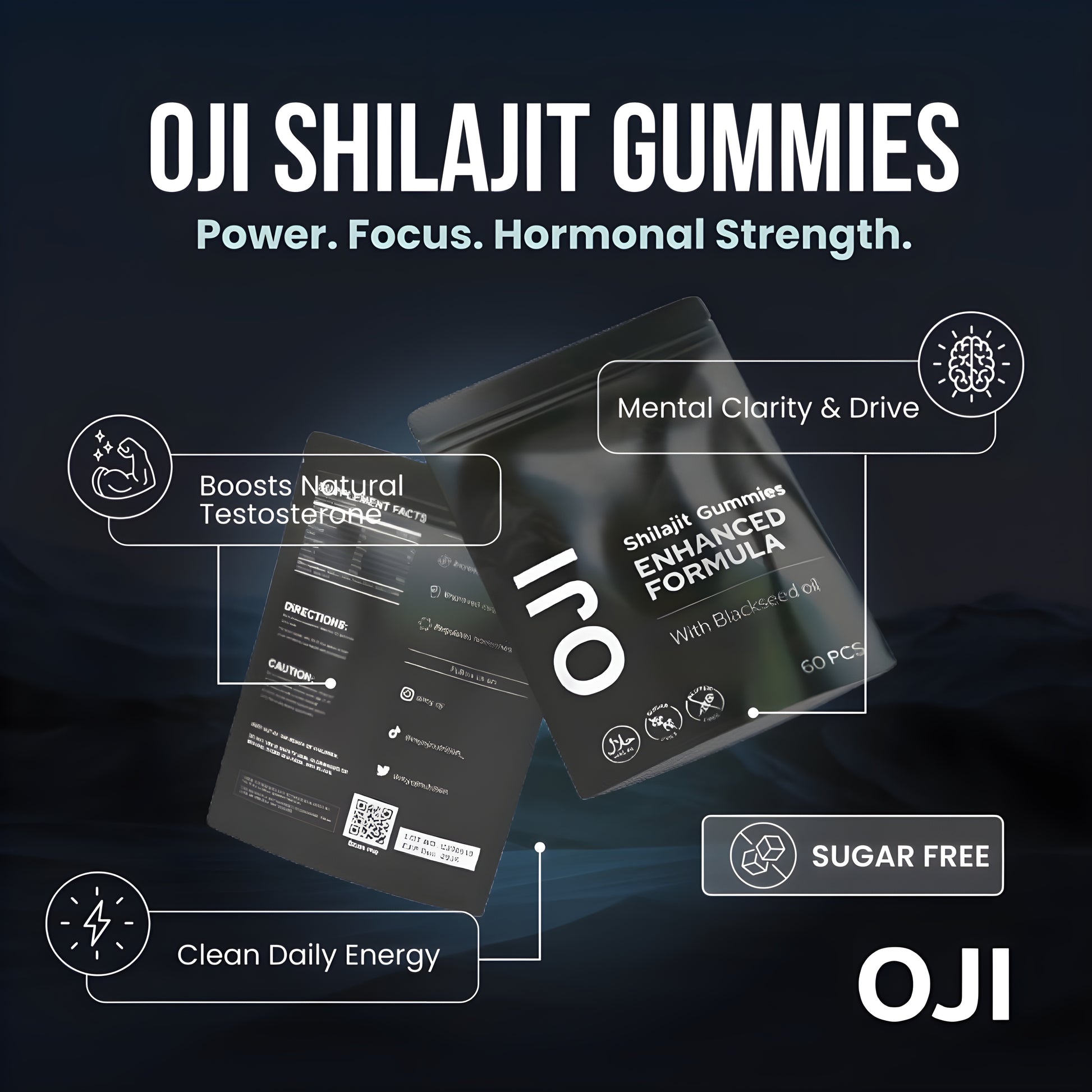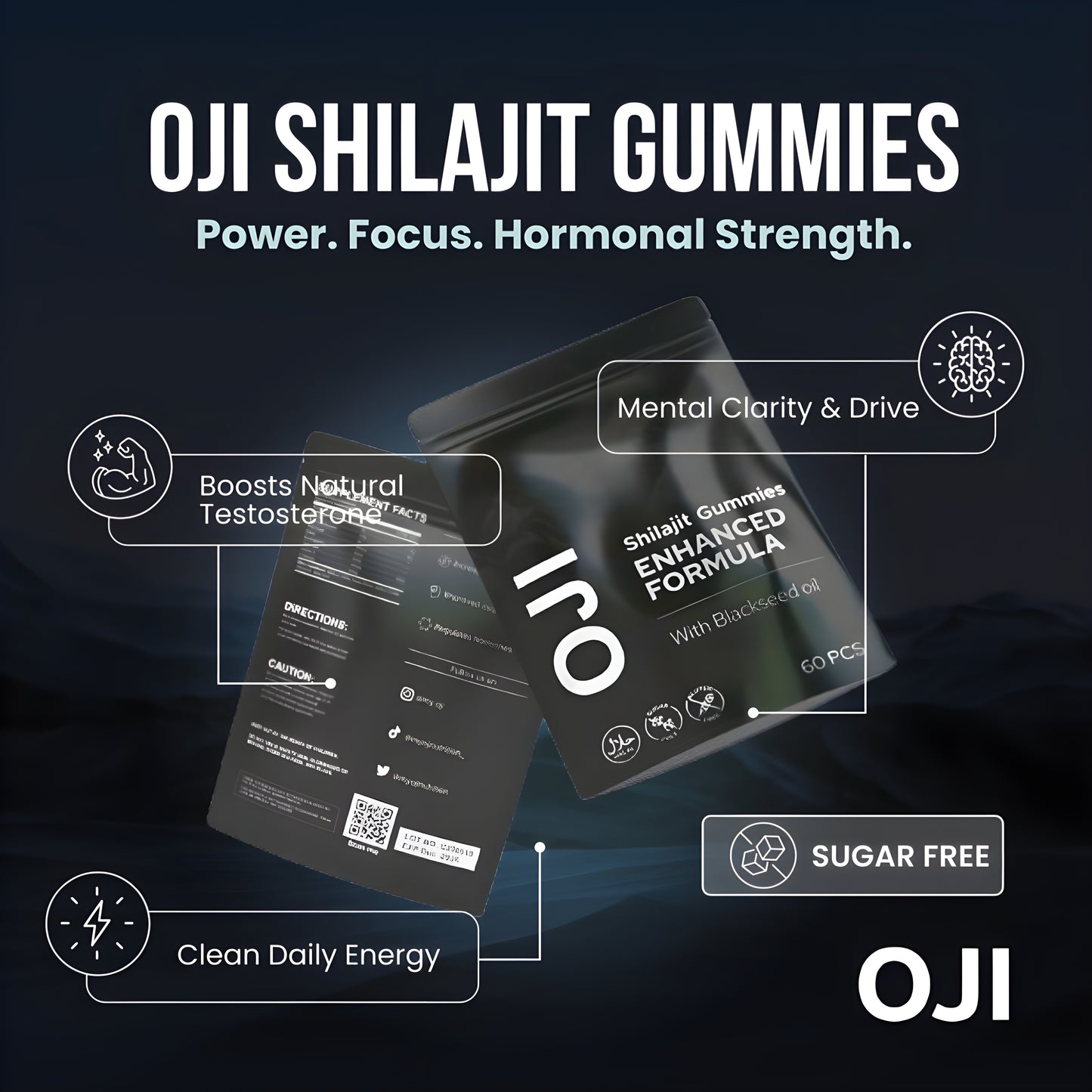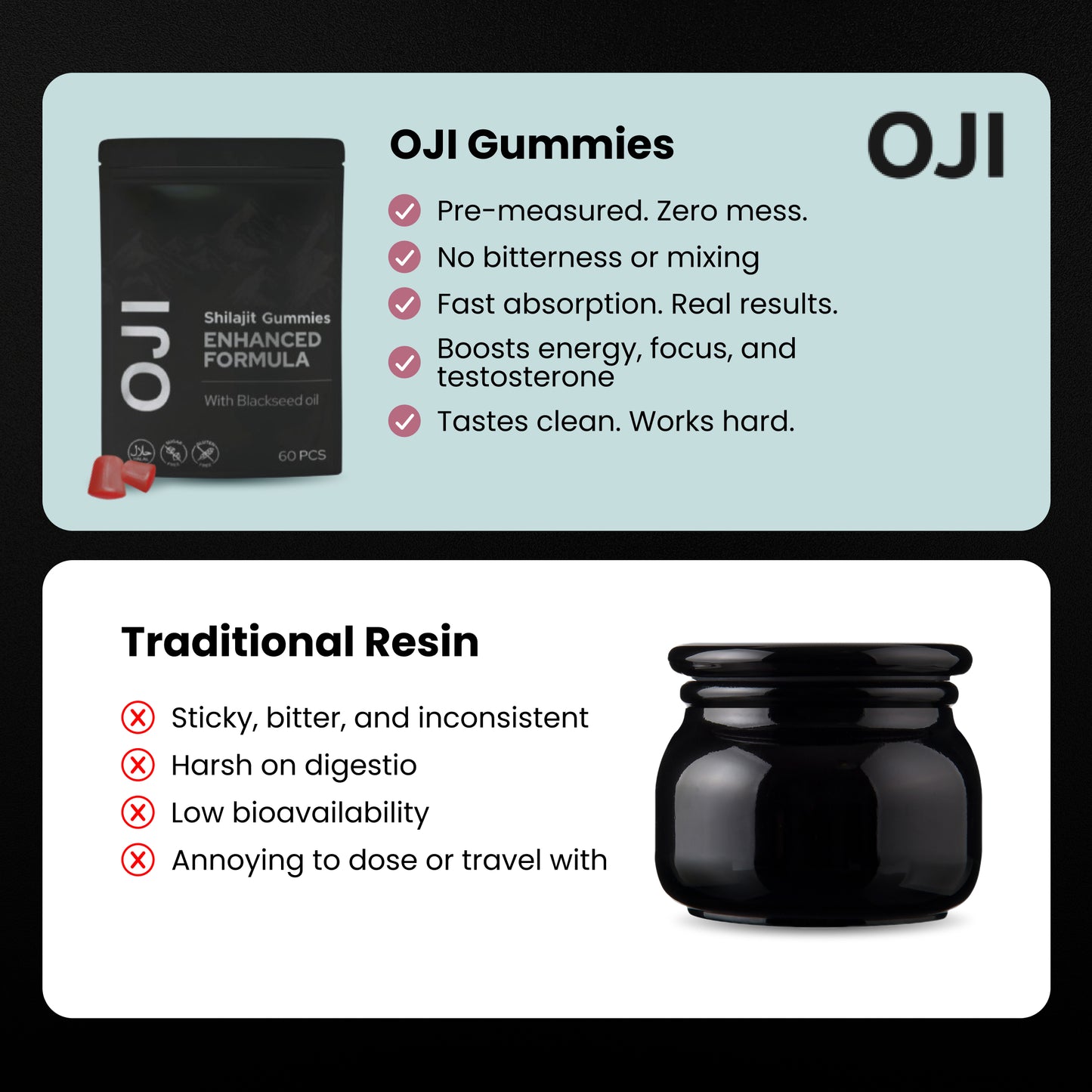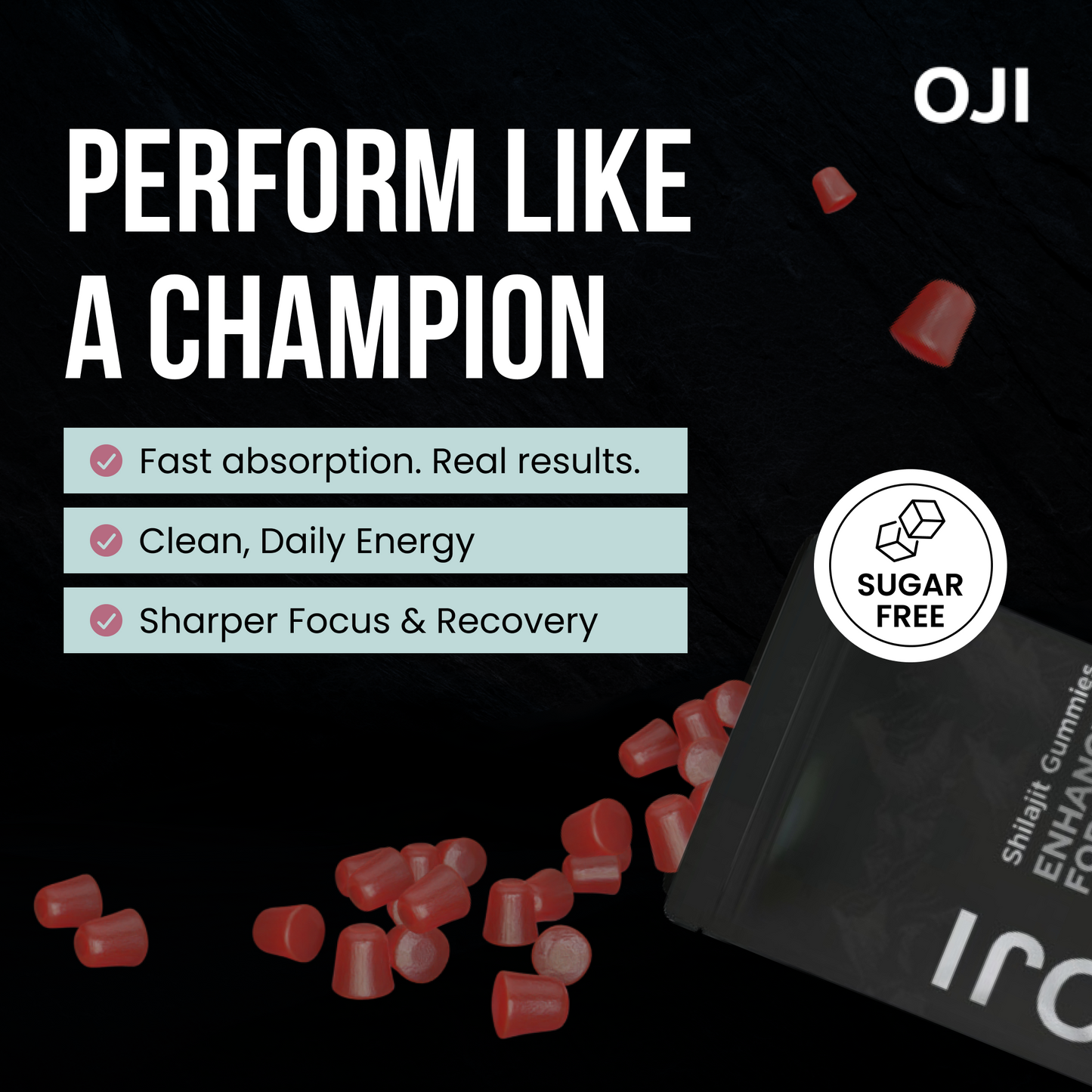Balancing your hormones naturally isn’t a complex, restrictive protocol. The first step is to tune into your body's unique signals and strengthen the foundations of your health: your diet, how you manage stress, and the quality of your sleep.
This is about making conscious lifestyle choices that nourish your endocrine system. Implement simple actions like eating vibrant, nutrient-dense foods, learning to manage your cortisol levels, and making restorative rest a non-negotiable. This approach puts you back in the driver's seat, helping restore your body’s natural harmony.
Decoding Your Body's Hormonal Signals
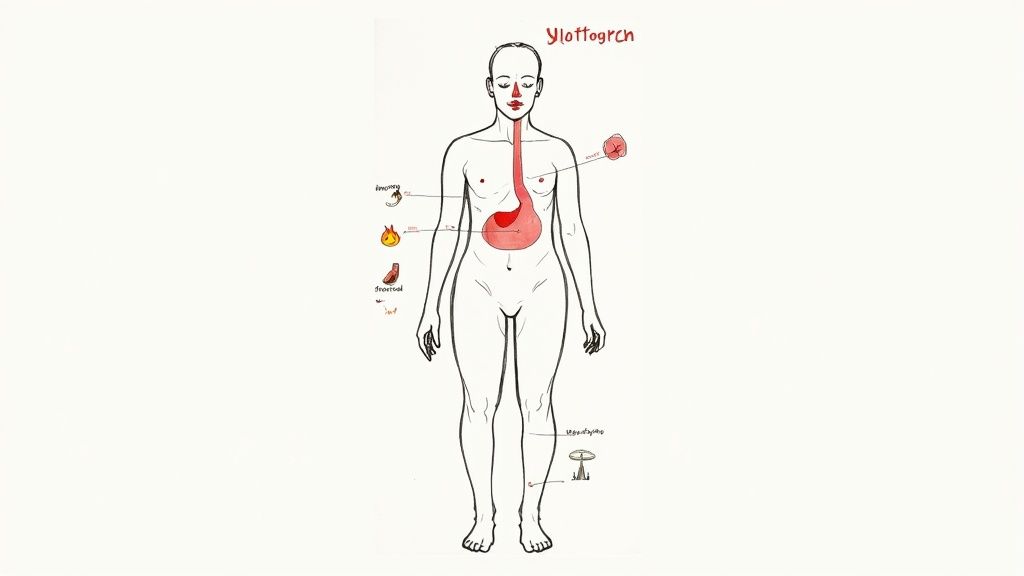
Before you can bring anything back into balance, you first need to learn the language your body is speaking. That persistent fatigue, those sudden mood shifts, or the weight that won't budge? Those aren't just random annoyances; they're often direct messages from your endocrine system.
Hormones are your body’s sophisticated chemical messengers, and they have a hand in everything from your energy and appetite to your sleep cycle and emotional resilience. Getting to know the key players is the first step towards taking back control.
The Major Hormones at Play
While your body produces over 50 different hormones, a handful have an outsized impact on how you feel day-to-day. Think of them as the executive team running your internal operations.
- Oestrogen: Best known as a female sex hormone, it also influences mood, bone health, and cholesterol levels in everyone. When it's off-kilter, you might notice irregular cycles, bloating, or mood swings.
- Cortisol: Famously called the "stress hormone," its main job is to gear your body up to handle stress. But when cortisol is chronically high, it can wreck your sleep, encourage belly fat, and lead straight to burnout.
- Thyroid Hormones (T3 & T4): These are the masters of your metabolism. If they're out of sync, you could experience anything from weight changes and fatigue to hair loss or feeling constantly cold or hot.
- Insulin: Produced by the pancreas, insulin is all about managing your blood sugar. An imbalance here can trigger energy crashes, intense sugar cravings, and contribute to more serious health issues down the line.
The crucial thing to remember is that these hormones don't operate in a vacuum. A spike in cortisol from a stressful week can easily disrupt your sleep, which in turn messes with your insulin sensitivity and oestrogen levels. It’s a delicate, interconnected web.
Common Signs Your Hormones Are Asking for Help
So, what are the distress signals? The symptoms can be subtle at first, often easy to brush off as just part of a busy life. But learning to spot the patterns is one of the most powerful diagnostic tools you have.
This simple table connects some common feelings to the hormones that might be involved, helping you start to connect the dots.
Common Symptoms and Their Potential Hormonal Links
| Symptom | Potential Hormones Involved | What This Could Indicate |
|---|---|---|
| Persistent Fatigue | Cortisol, Thyroid (T3/T4) | Adrenal fatigue or an underactive thyroid. |
| Unexplained Weight Gain | Insulin, Cortisol, Oestrogen | Insulin resistance, chronic stress, or oestrogen dominance. |
| Mood Swings/Irritability | Oestrogen, Progesterone, Cortisol | Fluctuations in sex hormones or high stress levels. |
| Brain Fog & Poor Focus | Cortisol, Oestrogen, Thyroid | Adrenal stress, low oestrogen, or thyroid imbalance. |
| Poor Sleep/Insomnia | Cortisol, Melatonin, Progesterone | High nighttime cortisol or low sleep-promoting hormones. |
| Sugar Cravings | Insulin, Ghrelin | Blood sugar instability or imbalances in hunger hormones. |
Recognising these patterns is the first step. They're clues telling you where to focus your efforts for the biggest impact on your wellbeing.
Pay close attention if you’re consistently experiencing things like:
- Unexplained Fatigue: The kind of tired that a full night's sleep doesn't seem to fix.
- Weight Changes: Struggling to lose weight or suddenly gaining it, especially around your middle.
- Mood Instability: Feeling more irritable, anxious, or down than is normal for you.
- Cognitive Issues: That frustrating "brain fog" or difficulty concentrating can often be a hormonal sign. You can dig deeper into how to identify the symptoms of brain fog in our detailed guide.
- Sleep Disturbances: Trouble falling asleep, staying asleep, or waking up feeling like you haven't slept at all.
Unfortunately, it's all too common to normalise these feelings. This creates a huge awareness gap. A recent survey highlighted this, showing that 58% of women have moderate to low knowledge of hormonal health, and a staggering 66% have never had their hormones tested. This lack of clarity often stops people from getting the support they need.
By learning to connect these everyday symptoms to their potential hormonal roots, you transform vague feelings of being "off" into actionable information. This awareness is the true starting point for balancing hormones naturally.
This foundational knowledge is your superpower. As we dive into the specific diet and lifestyle strategies, you'll be able to connect the advice directly back to the signals your body is already sending.
Eating for Optimal Hormone Function

What you put on your plate is one of the most powerful and direct tools you have for balancing your hormones. This isn't about harsh restrictions; it’s about giving your body the right building blocks it needs to produce, regulate, and clear out hormones effectively.
A genuinely hormone-supportive diet isn't about counting calories. It’s about the quality of your food and how you combine different macronutrients to create stable energy. This is how you nourish your endocrine system from the inside out.
The Foundation of Every Meal: Blood Sugar Stability
One of the fastest ways to throw your hormones into chaos is with erratic blood sugar levels. When your blood sugar spikes and crashes, it sends your body on a rollercoaster, triggering floods of insulin and cortisol, which can easily knock other hormones like oestrogen out of sync.
The secret to avoiding this is building every meal around a simple, effective trio: protein, healthy fats, and fibre. These three work together to slow down how quickly sugar enters your bloodstream, giving you steady, sustained energy.
- Quality Protein: Think of protein as the anchor for your meal. It keeps you full and provides the amino acids essential for making hormones. Great sources include organic chicken, wild-caught fish, eggs, lentils, and chickpeas.
- Healthy Fats: Fats are non-negotiable for manufacturing sex hormones and keeping inflammation in check. Prioritise sources like avocado, olive oil, nuts, and seeds (flax and chia are fantastic).
- Fibre-Rich Carbohydrates: Fibre is food for your good gut bacteria, which play a huge role in hormone metabolism. Choose complex carbs like sweet potatoes, quinoa, oats, and a massive variety of colourful vegetables.
A simple swap could be ditching a bowl of sugary cereal for Greek yoghurt topped with berries, a sprinkle of chia seeds, and a few walnuts. You’ve just hit all three targets and set yourself up for a much more stable morning.
Target Specific Hormonal Pathways with Key Nutrients
Beyond that foundational trio, certain foods contain compounds that directly support specific hormonal jobs. By weaving these into your diet, you can offer targeted support exactly where your body needs it.
For example, cruciferous vegetables like broccoli, cauliflower, and kale are packed with a compound called indole-3-carbinol. This nutrient is brilliant for helping the liver process oestrogen efficiently, a key step in maintaining healthy oestrogen levels.
Likewise, the omega-3 fatty acids you get from oily fish like salmon, mackerel, and sardines are powerful anti-inflammatories. Chronic inflammation can seriously mess with hormone signalling, so tamping it down with a consistent intake of omega-3s is a smart move for your overall hormonal health.
Remember, the goal isn't perfection—it's consistency. Just adding one serving of cruciferous veg or a source of healthy fat to your daily meals can lead to significant benefits over time.
Foods and Habits to Approach with Mindfulness
Just as some foods help, others can really hinder your progress. It’s not about banning them forever, but about understanding their impact and reducing how much you rely on them.
The two main culprits are excessive sugar and ultra-processed foods. These are notorious for triggering sharp insulin spikes and fuelling inflammation, working directly against your efforts to find hormonal balance.
- Excessive Sugar: This means the obvious stuff like sweets and fizzy drinks, but also the hidden sugars in sauces, dressings, and many so-called "healthy" snack bars.
- Ultra-Processed Foods: If it comes in a package with a long list of ingredients you can’t pronounce, be wary. These often contain industrial seed oils and refined flours that disrupt gut health and ramp up inflammation.
Making mindful swaps can make a world of difference. Flavouring your water with fresh fruit instead of grabbing a sugary drink, or whipping up your own salad dressing with olive oil and lemon juice, are small but powerful changes. If you’re constantly tired, it's also worth looking into which foods can help you fight fatigue for a more sustained energy boost.
By focusing on whole, nutrient-packed foods, you create an internal environment where your hormones can thrive. It’s a sustainable, empowering approach that forms the very cornerstone of lasting hormonal harmony.
Lifestyle Tweaks to Get Your Hormones Back in Sync
Your daily habits are speaking directly to your hormones, whether you realise it or not. While what you eat lays the foundation, it’s the other stuff—how you handle stress, how well you sleep, and how you move your body—that really locks in hormonal harmony. Think of these as powerful levers you can pull every single day.
Getting a handle on your lifestyle is a game-changer for naturally balancing hormones. It’s no surprise that so many people are looking for alternatives to conventional treatments. Just look at the recent UK data. A 2025 survey found that while 61% of women felt they’d lost their motivation because of menopausal symptoms, only around 14% are actually on HRT. That tells you a huge number are exploring lifestyle-first strategies to feel better. You can dig into the numbers in the full menopause statistics breakdown from Chemist4U.
Get a Handle on Your Stress Response
Chronic stress is probably the single biggest hijacker of your hormones. When you’re constantly feeling the pressure, your body is churning out cortisol, the main stress hormone. This isn't just a fleeting problem; constantly high cortisol can throw your reproductive hormones out of whack, mess with your thyroid, and send your blood sugar on a rollercoaster.
The secret isn’t to eliminate stress (as if!), but to get better at managing your response to it. It’s all about weaving small, consistent practices into your day that tell your nervous system, "it's okay, you're safe."
Try these simple but effective techniques:
- Mindful Breathing: Just five minutes of slow, deep belly breathing can genuinely lower your cortisol levels. Give box breathing a go: breathe in for a count of four, hold for four, breathe out for four, and hold for four. Easy.
- Schedule in Some Downtime: Block out tiny, 10-minute breaks in your workday to get away from your screens. Go for a quick walk around the block, put on a song you love, or just sit quietly with a cuppa.
- Get a Dose of Nature: Believe it or not, spending just 20 minutes in a park or garden can seriously slash stress hormone levels. No need for a massive hike—your local green space will do the trick.
Make Restorative Sleep a Priority
Sleep is non-negotiable. It’s when your body gets down to the critical business of hormonal repair and regulation. Skimp on sleep, and you’ll send cortisol soaring the next day, mess with the hormones that control your appetite (ghrelin and leptin), and make your body less sensitive to insulin.
Aiming for 7-9 hours of quality sleep a night is one of the most powerful things you can do for your hormonal health. If you struggle to nod off, it's time to work on your "sleep hygiene"—the little habits and rituals that set the stage for a good night's rest.
You can't force yourself to sleep. What you can do is create the perfect conditions for sleep to happen all on its own. Tiny, consistent tweaks to your evening routine make all the difference.
Craft a simple wind-down routine that works for you:
- Go Dim: About an hour before you want to sleep, turn down the lights. This signals to your brain that it’s time to start producing melatonin, the sleep hormone.
- Screen-Free Zone: The blue light from your phone and laptop is a major melatonin blocker. Put them away at least 60-90 minutes before bed.
- Keep it Cool: Your body temperature naturally needs to drop a bit to initiate sleep. Make sure your bedroom is comfortably cool.
Rethink Movement for Hormonal Health
Exercise is brilliant, but it's all about how you move. Pushing yourself through endless high-intensity workouts can sometimes just add more stress to an already frazzled system, which means more cortisol. The goal is to build resilience, not burn yourself out.
For happy hormones, your weekly routine should have a bit of everything.
- Strength Training: Lifting weights or using your own bodyweight builds muscle, which is fantastic for improving how your body uses insulin and for firing up your metabolism. Try to get two or three sessions in a week.
- Gentle Movement: Things like walking, yoga, and a gentle cycle are perfect for managing stress and boosting circulation without spiking cortisol. A daily walk is an absolute powerhouse for your health.
- Mindful Exercise: Practices like yoga and Pilates do more than just build strength and flexibility—they’re proven to calm the nervous system. For those in midlife navigating big hormonal shifts, certain routines can be a lifesaver. This guide to Pilates for women over 50 has some great, targeted advice.
When you bring these three pillars—stress, sleep, and movement—together, they create a powerful synergy. Each one supports the others, helping you build a strong foundation for long-lasting hormonal balance.
Using Supplements and Adaptogens Strategically
While a whole-food diet is the absolute cornerstone of hormonal health, sometimes your body just needs a little extra, more targeted support. This is where high-quality supplements and adaptogens can be game-changers, acting as powerful allies on your journey to feeling your best.
Think of them not as a magic bullet, but as strategic tools. They help fill any nutritional gaps and give your body the resources it needs to handle stress more effectively. It’s all about complementing a healthy lifestyle, not replacing it.
Essential Nutrients for Hormone Production
First things first, let's talk about the non-negotiables. Certain vitamins and minerals are the fundamental building blocks your body needs to create and regulate hormones. If you're running low on these, your endocrine system simply can't do its job properly.
- Vitamin D: Often called the "sunshine vitamin," it actually acts more like a hormone in the body. It's essential for healthy thyroid function and plays a big part in producing sex hormones. Since so many of us in the UK are deficient, especially in the darker months, a supplement is often a really smart move.
- B Vitamins: This group of vitamins, especially B6 and B12, is crucial for just about everything. They help create mood-regulating neurotransmitters and support your liver in clearing out excess hormones like oestrogen. They’re also key for energy production, which is a lifesaver when you're dealing with the fatigue that often comes with hormonal imbalance.
- Magnesium: This mineral is a true superstar, involved in over 300 different processes in the body. It helps calm the nervous system, supports deep and restorative sleep, and can improve insulin sensitivity—all of which are vital for hormonal harmony.
The infographic below really drives home how interconnected everything is. Stress, sleep, and movement are the pillars that hold up your hormonal health, and targeted supplements can provide incredible support in each of these areas.
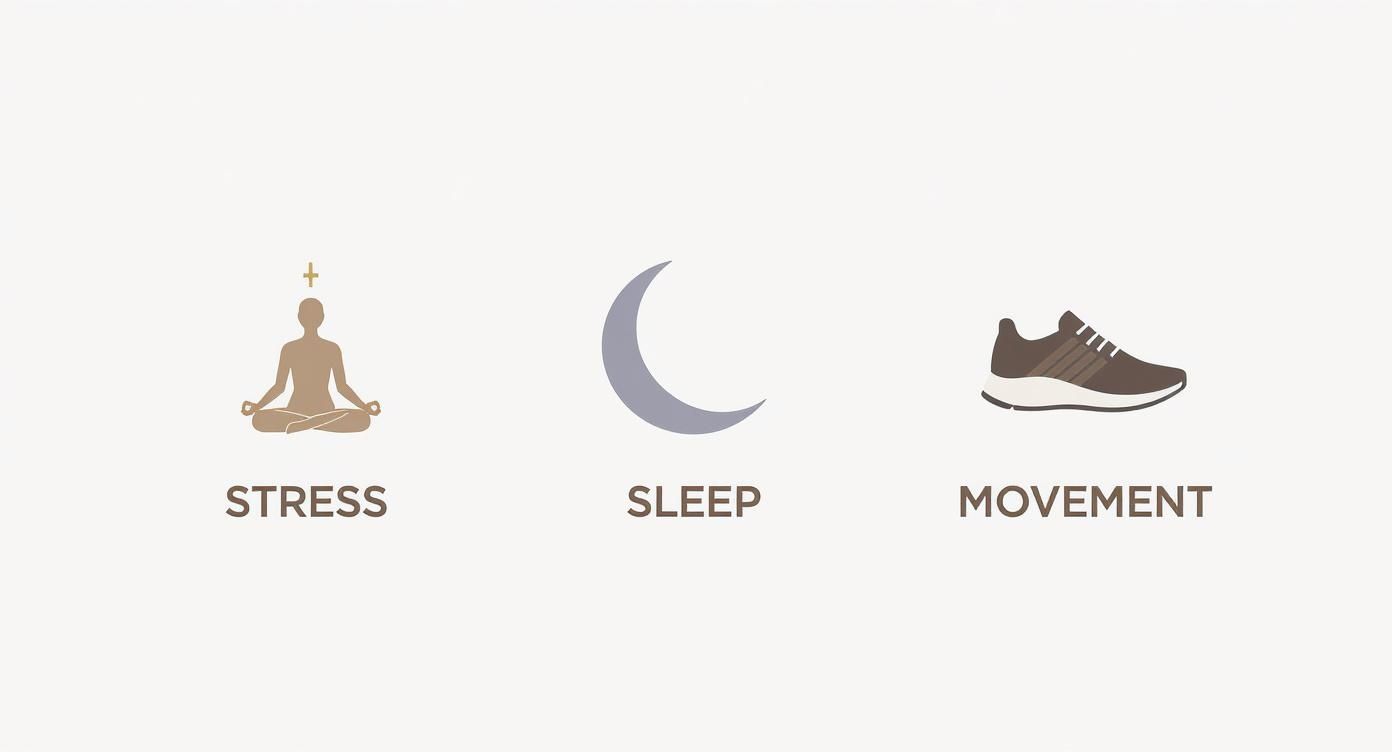
As you can see, making a positive change in one area creates a ripple effect, lifting all the others.
The Power of Adaptogens
Adaptogens are a fascinating class of herbs. They don't just target one specific issue; instead, they help your body become more resilient to all kinds of stress—whether it's physical, chemical, or emotional. They work intelligently to bring your body's systems back toward a state of balance, or homeostasis.
Two of the most well-known and researched adaptogens for hormonal support are Ashwagandha and Shilajit. They work in different but wonderfully complementary ways to help you navigate the pressures of modern life.
Adaptogens aren't a quick fix that just masks your symptoms. Instead, they help train your body to respond to stress more efficiently. Think of them as a personal trainer for your adrenal glands, helping them become stronger and more resilient over time.
To get a better sense of what might be right for you, we've put together a comprehensive guide on the best supplements for hormone balance.
To help you understand the unique benefits of some popular adaptogenic herbs, have a look at this comparison table.
A Guide to Common Adaptogens for Hormonal Support
| Adaptogen | Primary Benefit | Best For | Considerations |
|---|---|---|---|
| Ashwagandha | Stress & Cortisol Reduction | Feeling "wired but tired," anxiety, poor sleep quality, supporting thyroid function. | Can be calming; may interact with thyroid medication. Best taken consistently. |
| Rhodiola Rosea | Energy & Mental Stamina | Physical and mental fatigue, burnout, brain fog, improving exercise performance. | More stimulating; best taken in the morning to avoid sleep disruption. |
| Shilajit | Cellular Energy & Nutrient Absorption | Deep-seated fatigue, mineral deficiencies, feeling run-down, boosting overall vitality. | Look for purified forms. Rich in minerals and fulvic acid. |
This table is just a starting point, but it shows how different adaptogens can offer tailored support depending on what your body is going through.
Ashwagandha for Stress Resilience
There's a reason Ashwagandha is one of the most famous adaptogens out there—it has a remarkable ability to help lower cortisol levels. By calming an overactive stress response, it can ease feelings of anxiety, dramatically improve sleep quality, and support thyroid function.
If you often feel "wired but tired" and struggle to switch off in the evening, Ashwagandha could be a fantastic addition to your routine. It gently soothes the nervous system without making you drowsy, promoting a lovely sense of calm focus.
Shilajit for Energy and Vitality
Shilajit is a unique, mineral-rich substance that has been used in traditional Ayurvedic medicine for centuries to restore energy and vitality. It's absolutely packed with over 85 trace minerals and, crucially, fulvic acid, which helps your cells absorb these nutrients much more effectively.
By supporting your mitochondria—the tiny power plants inside your cells—Shilajit helps combat fatigue at its source. It's a brilliant choice if you're feeling depleted and run-down, offering a clean, natural lift without the jitters you get from caffeine. Combining Shilajit with other adaptogens like Ashwagandha, as found in Oji Shilajit gummies, creates a powerful synergy that tackles both stress and fatigue at the same time.
Choosing and Using Supplements Wisely
Before you start taking anything new, it's always a good idea to have a chat with a healthcare professional, like a GP or a registered nutritional therapist. They can help you figure out the right dose and make sure a supplement is right for you.
When you're ready to purchase, always put quality first. Look for reputable brands that are transparent about where they source their ingredients and use third-party testing to prove the purity and potency of their products. This is your best guarantee that you're getting a safe, effective supplement that will actually help you reach your health goals.
Knowing When to Call in the Experts
Trying to balance your hormones naturally with good food, a better lifestyle, and the right supplements is a brilliant place to start. These are the foundations of long-term wellness, and they can make a massive difference. But it's also important to know when self-care isn't quite enough.
Sometimes, you need a professional medical opinion. Think of it this way: natural approaches and medical support aren't rivals. They should work hand-in-hand to give you the best possible care.
When Your Body is Sending an SOS
Mild fatigue or the odd grumpy day can often be sorted with a few lifestyle tweaks. But some symptoms are your body's way of telling you something more serious is going on. If you're dealing with persistent problems that just aren't getting better, it's time to book an appointment with your GP.
Keep an eye out for these red flags:
- Sudden, big changes: Think rapid weight gain or loss that you can't explain, sudden hair loss, or a massive shift in your menstrual cycle.
- Severe symptoms: We're talking about intense pelvic pain, crippling fatigue that stops you from living your life, or mood swings that feel completely out of your control.
- Things just aren't improving: You've been diligently following a natural plan for a few months, but your main concerns haven't budged.
- New or worsening issues: New problems like heart palpitations, extreme anxiety, or digestive trouble have popped up alongside your other symptoms.
These are all signs that there could be an underlying condition that needs a proper diagnosis from a doctor.
How to Have a Productive Chat with Your Doctor
Being your own best advocate in a doctor's surgery is a real skill. The key to a good conversation is going in prepared. A little bit of organised information can make all the difference.
Try keeping a simple symptom journal for a few weeks before your appointment. Note down:
- What your symptoms are (e.g., bloating, low mood, tiredness).
- When they happen (e.g., the week before your period, after eating).
- How bad they are on a scale of 1-10.
- What you've already tried to feel better.
Walking into your appointment with a clear record of your symptoms completely changes the conversation. You go from saying, "I just don't feel right," to "Here are the specific patterns I've noticed and this is how they're affecting my daily life."
This simple step helps your doctor get the full picture, making it much easier for them to suggest the right tests and figure out what to do next.
Getting to Grips with Hormone Tests
If your doctor thinks a hormone imbalance might be the issue, they'll likely recommend some testing. Knowing a bit about the options can help you feel more in control.
- Blood Tests: This is the most common starting point. A quick blood test can check levels of key hormones like thyroid hormones (TSH, T3, T4), cortisol, oestrogen, and testosterone.
- Saliva Tests: These are often used to track cortisol levels at different times of the day. It gives a great snapshot of your adrenal health and how your body is handling stress.
- Urine Tests (like the DUTCH Test): This is a more comprehensive option. It doesn't just show hormone levels, but also how your body is actually using and breaking them down.
It’s clear that more of us in the UK are looking for natural solutions, but there's a growing awareness of underlying problems. A 2025 report showed that over 52% of British adults have at least one significant, undiagnosed hormonal imbalance. And while only about 14% of women currently use HRT, it shows how vital a proper diagnosis is. You can read more about it in the UK hormonal health crisis guide from Wecovr.
Don't be afraid to ask your doctor why they're recommending a certain test. Seeking professional guidance is a sign of strength, not weakness. It’s a crucial part of a truly holistic approach to balancing hormones naturally, ensuring you get to the root cause of the problem.
Common Questions About Natural Hormone Balance
Deciding to balance your hormones naturally is a brilliant move, but it’s normal to have a few questions before you dive in. Getting a clear picture of what to expect can help you feel more confident and set you up for success. Let's tackle some of the most common queries.
Think of this as a long-term investment in your well-being, not a quick fix. If you're looking for a wider view of the strategies involved, this comprehensive guide on how to balance hormones naturally offers some excellent expert tips that work hand-in-hand with what we're discussing here.
How Long Until I See Results?
This is usually the first thing people want to know! Unlike a prescription that forces a change, natural methods work with your body, and everyone’s pace is different.
Some people feel a noticeable lift in their energy and mood within just a few weeks of consistently improving their diet and sleep. For deeper-rooted issues like irregular cycles or chronic fatigue, it’s more realistic to expect changes over three to six months.
The goal isn’t perfection; it’s consistency. Every supportive meal, mindful moment, and good night's sleep is a small deposit into your health account that really adds up over time.
Is Diet Enough to Balance Hormones?
Your diet is, without a doubt, a massive piece of the puzzle. The food you eat gives your body the raw materials it needs to make hormones and helps you get off the blood sugar rollercoaster that so often throws things out of whack. A good diet alone can make a huge difference.
That said, it’s rare for diet to be the only thing that needs attention. Chronic stress, poor sleep, and not moving your body in the right way all play a huge part in your endocrine health. The most powerful approach is one that looks at the whole picture. A nutrient-rich diet is far more effective when you’re also managing stress and getting restorative sleep.
Are Adaptogens and Supplements Safe for Everyone?
Supplements like magnesium and adaptogenic herbs such as Ashwagandha are generally safe for most healthy adults and can be incredibly helpful for filling nutritional gaps and managing stress.
However, "natural" doesn't automatically mean it's right for everyone. Adaptogens are powerful botanicals and can sometimes interact with medications, particularly for thyroid issues or autoimmune conditions. They also might not be a good idea during pregnancy or while breastfeeding.
It's always smart to have a chat with a healthcare professional, like your GP or a qualified nutritional therapist, before adding any new supplement to your routine. They can help you figure out what’s right for your body and ensure your approach is both safe and effective.
Ready to support your body’s natural harmony? Oji Shilajit gummies combine the vitality-boosting power of Shilajit with stress-reducing Ashwagandha in one simple, tasty format. Take control of your energy and find your balance by visiting https://myoji.co.uk to learn more.


